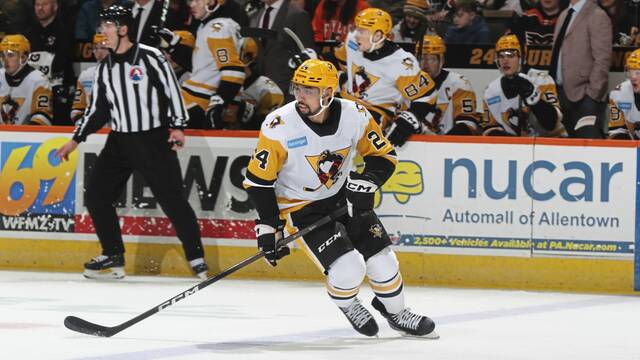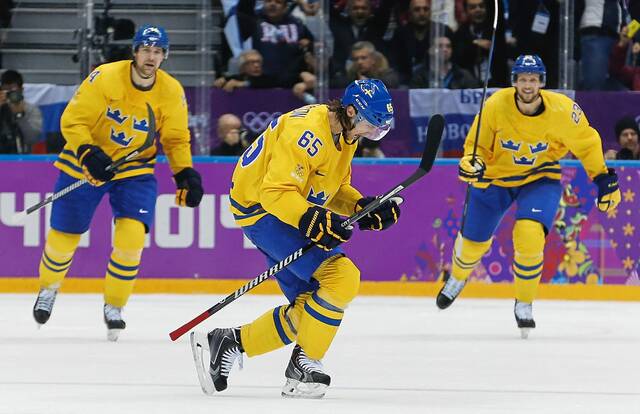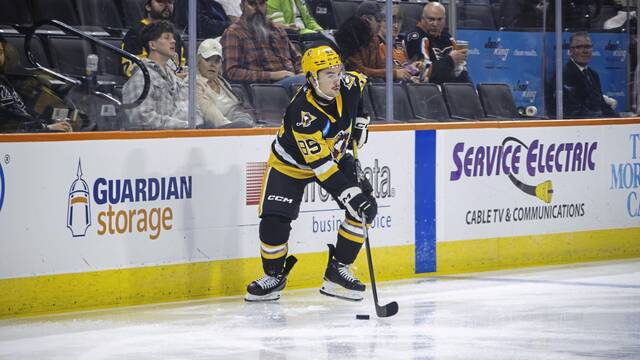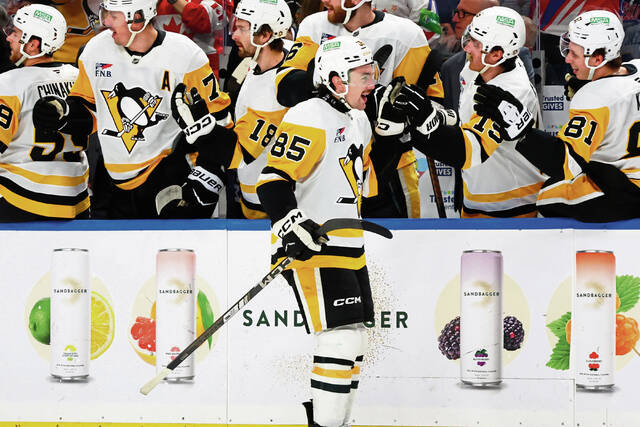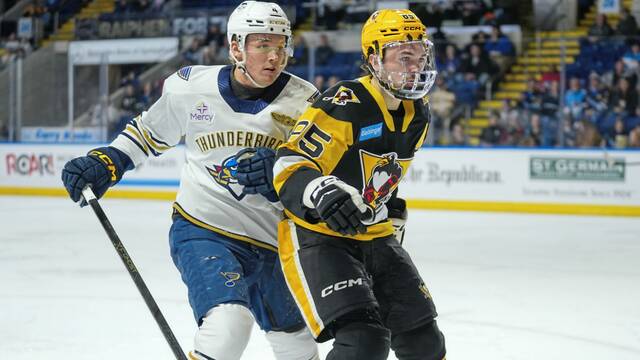While the NHL is on hold because of the ongoing coronavirus pandemic, the Tribune-Review will offer the Double Team project, an examination of the five best players who have contributed substantially to the Penguins and another franchise. For consideration, a player must have played at least the equivalent of a full season for each franchise. (Sorry, Jarome Iginla fans.)
Today, a look at the Los Angeles Kings. Part of the 1967 expansion along with the Penguins, the Kings were named as such by owner Jack Kent Cooke to give his franchise a perception of royalty. In 162 all-time games against the Kings, the Penguins have a not-so-majestic 67-73-22 record.
1. Luc Robitaille, left winger
Robitaille’s numbers with the Penguins are modest. And they don’t necessarily meet the “full season” qualifier for this exercise. But considering his only season with the Penguins was the lockout-shortened 1994-95 campaign, he will get an exemption. Plus, he had a speaking part in “Sudden Death,” the so-bad-it’s-great action movie filmed at the Civic Arena.
In the summer of 1994, Kings general manager Sam McMaster (and, more importantly, center Wayne Gretzky) really liked tough right winger Rick Tocchet and approached Penguins general manager Craig Patrick about acquiring him. Patrick was willing to deal but extracted a heavy toll from the Kings in Luc Robitaille, the most popular player in Kings history.
The hope was the skilled Robitaille, who had reached the 40-goal mark each of his first eight NHL seasons, would mesh well with the skill of franchise icon Mario Lemieux. But Lemieux took a leave of absence during the 1994-95 campaign to rest his body, weary from a back injury as well as treatments for Hodgkin’s Disease.
Robitaille fared just fine without Lemieux, putting up 23 goals and 42 points in 46 games that season. During the playoffs, he dressed for 12 games and recorded 11 points, including seven goals. Two of his goals were game-winners, including a crucial score in a 6-5 overtime win against the rival Washington Capitals in Game 5 of an Eastern Conference quarterfinal series. The Penguins had entered that game down 3-1 in the series, and that victory spurred them to claim it in seven games.
Robitaille lasted only one season in Pittsburgh. Caught up in a roster purge by Patrick, who wanted to make the team faster and younger (i.e. cheaper), Robitaille was traded to the New York Rangers.
Of course, the Robitaille’s time with the Kings will forever define him. A ninth-round pick in the Kings’ 1984 draft class which included Major League Baseball pitcher Tom Glavine in the fourth round, Robitaille spent parts of 14 seasons in Los Angeles over three stints. Debuting in 1986-87, he won the Calder Memorial Trophy as the league’s top rookie and established himself as a consistent point producer, even before the arrival of Gretzky in 1988.
As Gretzky’s linemate, Robitaille reached career-highs in goals (63) and points (125) during the 1992-93 season and helped the Kings reach their first Stanley Cup Final that spring, losing to the Montreal Canadiens.
After a handful of seasons with the Penguins and Rangers, Robitaille returned to Los Angeles during the 1997 offseason in a trade and spent four solid seasons producing at a rate commensurate with the “dead puck era,” routinely reaching the 30-goal barrier.
In the 2001 offseason, Robitaille signed with the Detroit Red Wings for a two-year stint which allowed him to claim his first Stanley Cup ring in 2002. He re-signed with the Kings in 2003 and by the time he retired in 2006, Robitaille was the second-leading scorer in franchise history with 1,154 points in 1,077 games. Inducted into the Hockey Hall of Fame in 2009, Robitaille remains the NHL’s top scoring left winger of all-time with 1,394 points.
2. Larry Murphy, defenseman
Big things were expected of Murphy when he was drafted by the Kings No. 4 overall in 1980. And for the most part, he delivered, at least early on. As a 19-year-old rookie in 1980-81, he played extensively with the Kings’ vaunted “Triple Crown Line” of Marcel Dionne, Charlie Simmer and Dave Taylor. In 80 games, he recorded 76 points, a mark which remains an NHL record for rookie defensemen, and finished second in voting for the Calder Memorial Trophy.
Murphy never enjoyed the same success in his ensuring seasons with the Kings and by October of 1983, he was dealt to the Washington Capitals.
Something of a wayward soul after stints with the Capitals and Minnesota North Stars, Murphy found a home on the blue line of the offensively aggressive Penguins, who traded for him in December of 1990.
Meshing well with the likes of forwards such as Lemieux, Mark Recchi and Kevin Stevens, Murphy’s greatest performance came during the 1991 postseason. With No. 1 defenseman Paul Coffey hindered for much of the playoffs due to eye and jaw injuries, Murphy took command, particularly on the power play, and established a still-standing franchise record for points by a defenseman (23) during a postseason while helping the franchise claim its first Stanley Cup title.
A year later, the Penguins were champions once again, this time with Murphy as the established No. 1 defenseman following a midseason trade of Coffey to the Kings.
His greatest individual success came with the 1992-93 Penguins who won the Presidents’ Trophy as the top team during the regular season. In 83 games, he recorded career-highs in goals (22) and points (85). But the Penguins failed to win the Stanley Cup that season, or the next two seasons, and by July of 1995, Murphy was traded to the Toronto Maple Leafs.
3. Rob Scuderi, defenseman
An unfortunate slip of the tongue became Scuderi’s calling card as “the Piece.” In all reality, his defense should be what defines him.
A fifth-round pick of the Penguins in 1998, Scuderi didn’t become a full-time regular at the NHL level until 2006-07, when he helped the Penguins reach the playoffs for the first time in six years. The following season, Scuderi found a union with fellow defenseman Hal Gill as a shutdown pairing, routinely drawing assignments against the opposition’s top forwards, and helped the Penguins reach the Stanley Cup Final, losing to the Red Wings.
In 2008-09, Gill and Scuderi were fused at the hip once again and were vital to the Penguins reaching the Stanley Cup Final once again. But this time, they defeated the Red Wings in no small part due to Scuderi. During Game 6 of the series, Scuderi helped preserve a late 2-1 lead with a series of blocked shots involving his stick, hand, shin and skates.
Following that success, Scuderi joined the Kings as a free agent. In four seasons with that club, Scuderi only missed nine games. For most of that tenure, he found himself teamed with franchise defenseman Drew Doughty and in 2011-12, Scuderi helped the Kings piece together that franchise’s first Stanley Cup title, defeating the New Jersey Devils.
During the 2013 offseason, Scuderi re-signed with the Penguins. But by that point, the overall speed of the NHL had advanced by lightyears while his velocity was stuck in neutral, to be kind. A broken ankle early in the 2013-14 season did little to help that issue and by December of 2015, he was traded to the Chicago Blackhawks.
4. Tomas Sandstrom, right winger
Much like current Penguins forward Patric Hornqvist, Sandstrom, a fellow Swede, endured a lot of abuse by going to the net.
But Sandstrom was much nastier and dirtier than Hornqvist has ever been, even on his most cantankerous days.
A steady threat to reach the 20- or 30-goal mark with the Rangers during his first six NHL seasons, Sandstrom’s game reached another level when he joined the Kings via trade in January of 1990. During the 1990-91 season, playing with Gretzky, he posted a career-best 45 goals and 89 points in only 68 games.
His finest moment might have been during the Kings’ 1993 playoff run when he recorded 25 points – second on the team to Gretzky – in 24 games.
Prior to the 1993-94 traded deadline, Sandstrom was traded to the Penguins and he spent parts of three productive seasons in Pittsburgh.
After scoring 21 goals in 47 games during the shortened 1994-95 campaign, Sandstrom was a key component to the 1995-96 squad that reached the Stanley Cup Final. Working on one of the top power-play squads in franchise history, Sandstrom collected 17 goals on the man advantage to go with his 35 overall goals and 70 points.
Midway through the 1996-97 season, with the Penguins struggling to stay in playoff contention, Patrick made a series of trades to boost his club, including dealing Sandstrom to the Red Wings.
5. Ross Lonsberry, left winger
Like a lot of players of his time, Lonsberry was the beneficiary of the NHL’s expansion in the late 1960s and early 1970s. In his first three NHL seasons with the Boston Bruins, Lonsberry could only crack the lineup for 33 games. But once he was traded to the Kings in May of 1969, he became an NHL regular.
During the 1969-70 season, Lonsberry played in all 76 games and led the Kings with 42 points, including 20 goals. And despite the Kings finishing with a league-worst 38 points that season, Lonsberry even finished eighth in voting for the Hart Memorial Trophy, which recognizes the league’s MVP. In 1971-72, he improved on those totals with 25 goals and 53 points in 76 games.
An eccentric character, Lonsberry was renowned for wearing a toupee in his personal life but removing it to wear a helmet, which was something of a rarity for that era.
Selected for the 1972 All-Star Game, Lonsberry’s stay in Los Angeles was brief and he was shipped to the Philadelphia Flyers in January of that year. After becoming a key component to Philadelphia’s “Broad Street Bullies” teams that won Stanley Cup titles 1974 and 1975, Lonsberry was traded to the Penguins in the 1978 offseason.
Lonsberry had a solid but hardly spectacular three-year run with the Penguins to finish out his career. In 1978-79, he recorded 24 goals as well as 46 points. During 236 career games with the Penguins, Lonsberry recorded 129 points and helped the team reach the playoffs all three seasons he played in Pittsburgh.
Honorable mention: Lowell MacDonald, left winger; Marty McSorley, defenseman; Eddie Shack, left winger; Bryan Smolinski, center; Darryl Sydor, defenseman



